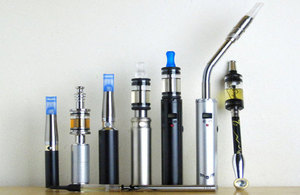‘Legal high’ and e-cigarette poison queries climb
Poisons specialists have flagged rises in calls and online queries about treating users of new psychoactive substances, misleadingly known as ‘legal highs’.

E-cigarettes
The Public Health England commissioned National Poisons Information Service (NPIS) today publishes its annual report for 2013 to 2014.
And there it has noted further increases in enquiries about so-called ‘legal highs’, especially about man-made cannabis substitutes.
For these drugs there were more than 130 phone queries, a 13-fold increase, from clinicians treating users in the past year. There was also a 2-fold increase in queries from NHS health professionals through the NPIS online database TOXBASE, over the same period.
The only ‘traditional’ illegal drug which frontline medics asked more questions about than so-called ‘legal highs’ last year, was cocaine.
Prof Simon Thomas, director of the Newcastle unit of the NPIS, said:
The manufacturers of these so-called ‘legal’ highs are moving quickly to create new drugs as these substances are banned.
This is a significant problem for us because although new products are chemically similar to ones that have been banned, each new substance is different and information on their safety is very limited. Synthetic forms of cannabis have been used increasingly in recent years and pose users a particular problem as some appear considerably more toxic than traditional cannabis and many are now controlled as class B drugs. Those who use these substances are taking a real gamble with their health.
Rosanna O’Connor, PHE’s director for drugs and alcohol, said:
PHE will be strengthening our efforts around tackling the use of new and emerging substances. We support local areas to address the issue. This involves sharing intelligence about these substances, including on the harms they cause and the best responses; educating young people about the risks; preventing and treating harm; and supporting those who have developed problems to address them.
PHE works with the Department of Health and Home Office to raise awareness about the dangers of drug misuse via the Government’s FRANK website and helpline www.talktofrank.co.uk.
NPIS is an advisory service for medics working in the frontline in doctors’ surgeries and hospitals. As well as a telephone hotline that medics can use, and which took more than 50,000 calls during the 2013 to 2014 period, NPIS runs an database called TOXBASE which offers clinical users background and treatment information on thousands of poisons and chemicals. The site was accessed more than 575,000 times in the period covered by the report.
The report, which only deals with queries to the service not total number of patient presentations at UK hospitals, also highlights that the advisory service saw a notable increase in queries about e-cigarettes.
In 2013 to 2014 the service was contacted for advice 204 times, which is more than all the calls it received on the subject between 2007 and 2013 combined.
Dr John Thompson, Director of the Cardiff unit of NPIS, said:
Most of the exposures of which we are aware were accidents. Almost half were in children and young people, including some cases concerning under-5s. Children are curious and we know from experiences with other products that sometimes they explore their environment by putting things in their mouths.
We know these products can contain toxic doses of nicotine so could cause serious harm to a child. Nicotine poisoning can be unpleasant and can potentially cause vomiting, hyperventilating, and changes in heart rate.
Luckily the incidents involving severe toxicity remain low, but e-cigarettes are becoming increasingly popular and adults using these products should be careful about keeping them out of reach of children, just as they would dishwasher tablets or liquid detergent capsules.
Ends
Notes to editors
-
NPIS directors from Edinburgh, Newcastle and Cardiff are available for interview. Please contact the press office for details 01235 825 406 or 405.
-
PHE exists to protect and improve the nation’s health and wellbeing and reduce health inequalities. It does this through advocacy, partnerships, world-class science, knowledge and intelligence, and the delivery of specialist public health services. PHE is an operationally autonomous executive agency of the Department of Health. Follow us on Twitter: @PHE_uk and Facebook: www.facebook.com/PublicHealthEngland.
Photo by pixelblume, used under Flickr Creative Commons.